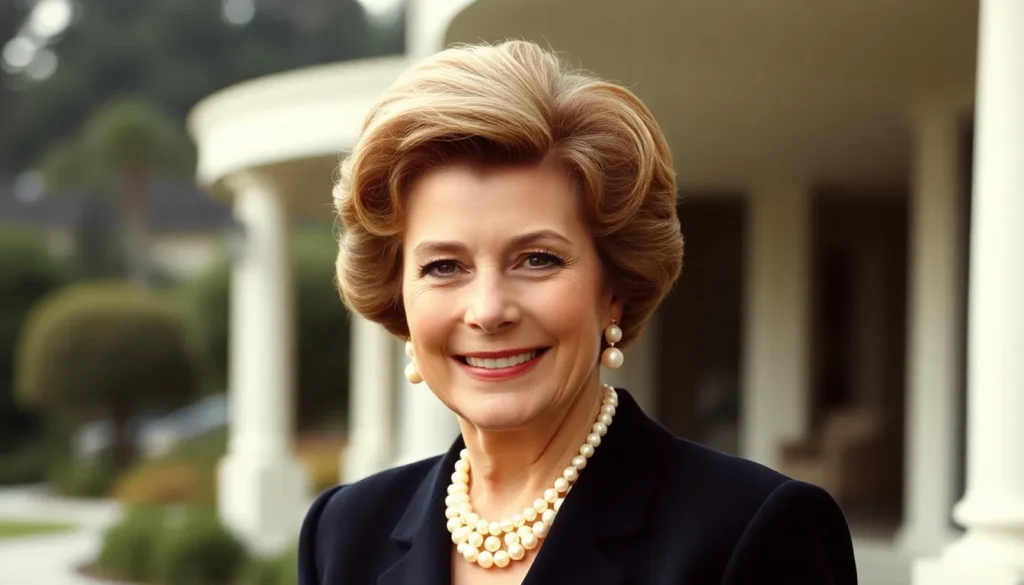Nancy Reagan, a name synonymous with elegance and resilience, left an indelible mark on American history. As the charming First Lady and devoted partner to President Ronald Reagan, she navigated the complexities of political life with grace. But what led to her passing in March 2016? The answer isn’t just a footnote in history; it’s a story that intertwines love, loss, and the harsh realities of aging.
While many remember her for her “Just Say No” campaign against drugs, her later years were overshadowed by health struggles. Curious about the details? Delve into the factors that contributed to her demise, and discover how her legacy continues to inspire conversations around health and wellness. Get ready to explore a narrative that’s as compelling as it is informative, shedding light on the life of a woman who shaped a nation.
Table of Contents
ToggleOverview of Nancy Reagan’s Life
Nancy Reagan, born on July 6, 1921, in New York City, significantly impacted American culture and politics. She entered the entertainment industry as an actress, appearing in numerous films during the 1940s and 1950s. Through her career, she met Ronald Reagan, whom she married in 1952, solidifying their partnership both personally and politically.
As First Lady from 1981 to 1989, she championed various causes, with the “Just Say No” drug prevention campaign being one of her most notable achievements. This initiative aimed to educate young people about the dangers of drug abuse and garnered widespread support across the nation. Her influence extended beyond this campaign, addressing issues such as education and health.
Throughout her life, she faced significant challenges, including her husband’s Alzheimer’s diagnosis in the 1990s. This experience shaped her perspective on health care and caregiving, bringing attention to the needs of families dealing with similar circumstances. Despite her struggles, she remained a strong supporter of her husband’s political career and legacy.
Nancy Reagan passed away on March 6, 2016, at the age of 94. The cause of death was congestive heart failure, a condition she battled prior to her passing. Her life story continues to resonate, emphasizing the importance of strength, resilience, and advocacy in the face of adversity.
The Health Struggles of Nancy Reagan


Nancy Reagan faced significant health challenges in her later years. Her medical history highlights various conditions that shaped her life.
Medical History
In 1985, Nancy Reagan underwent a mastectomy due to breast cancer. Following this treatment, she remained vigilant about her health. She experienced additional health issues, including osteoporosis and the need for a pacemaker in 2001, illustrating the difficulties of aging. During her husband’s battle with Alzheimer’s, she served as his primary caregiver, which took a toll on her own health. The combined stress of caregiving and her own medical conditions impacted her resilience significantly. Ultimately, these factors contributed to her declining health and influenced her later years.
Common Health Issues in Older Adults
Aging often brings common health issues that affect quality of life. Heart disease remains a leading cause of illness among seniors. Arthritis frequently limits mobility, making everyday tasks challenging. Additionally, cognitive decline poses risks for many older adults, significantly impacting their independence. Vision and hearing impairments can also become prevalent. Social isolation arises from these health issues, affecting mental well-being. Understanding these challenges helps navigate the complexities of aging.
Circumstances Surrounding Her Passing
Nancy Reagan’s passing marked the end of an era filled with significant contributions as a public figure and advocate. She experienced various health struggles leading up to her death.
Date and Location of Death
Nancy Reagan died on March 6, 2016. This event occurred at her residence in Bel-Air, Los Angeles. At the time of her passing, she was 94 years old, having faced declining health for several years prior. Her family surrounded her, providing support during her final moments.
Final Years and Care
The final years of Nancy Reagan’s life involved numerous health challenges, further complicated by her role as a caregiver. Throughout her husband’s battle with Alzheimer’s disease, she prioritized his needs, which greatly impacted her own well-being. In addition to caring for Ronald, she dealt with osteoporosis, a mastectomy in 1985, and later required a pacemaker. These struggles contributed to her overall decline, leading to her eventual death from congestive heart failure.
The Impact of Nancy Reagan’s Death
Nancy Reagan’s death deeply affected many, reflecting her significant role in American society. Her passing prompted widespread commentary on her life’s contributions and the causes she championed.
Public Reaction and Tributes
News of Nancy Reagan’s death elicited heartfelt reactions globally. Public figures, including politicians and celebrities, shared tributes celebrating her influence. President Barack Obama noted her dedication to family and country, while former First Lady Michelle Obama remembered her advocacy for children’s health. Vigils sprang up, and many citizens expressed condolences across social media platforms. Nonprofits that benefited from her initiatives highlighted her contributions to drug prevention and caregiving awareness. The outpouring of emotion demonstrated the profound impact she had on many lives, underscoring her legacy as an influential First Lady.
Legacy Considerations
Nancy Reagan’s legacy includes her extensive efforts in health advocacy and drug prevention. The “Just Say No” campaign remains a significant health initiative aimed at youth. Her experience as a caregiver for President Reagan during his Alzheimer’s battle influenced discussions on aging and caregiving support. Organizations focused on Alzheimer’s care often reference her contributions in promoting awareness. Many scholars analyze her role in shaping public policy related to health and wellness. Her approach to being a supportive spouse marked a shift in how society viewed the First Lady’s role. Events and discussions surrounding her legacy continue to honor her commitment to various causes.




